Russia investigation timeline: Robert Mueller and the probe into the Trump campaign's alleged collusion
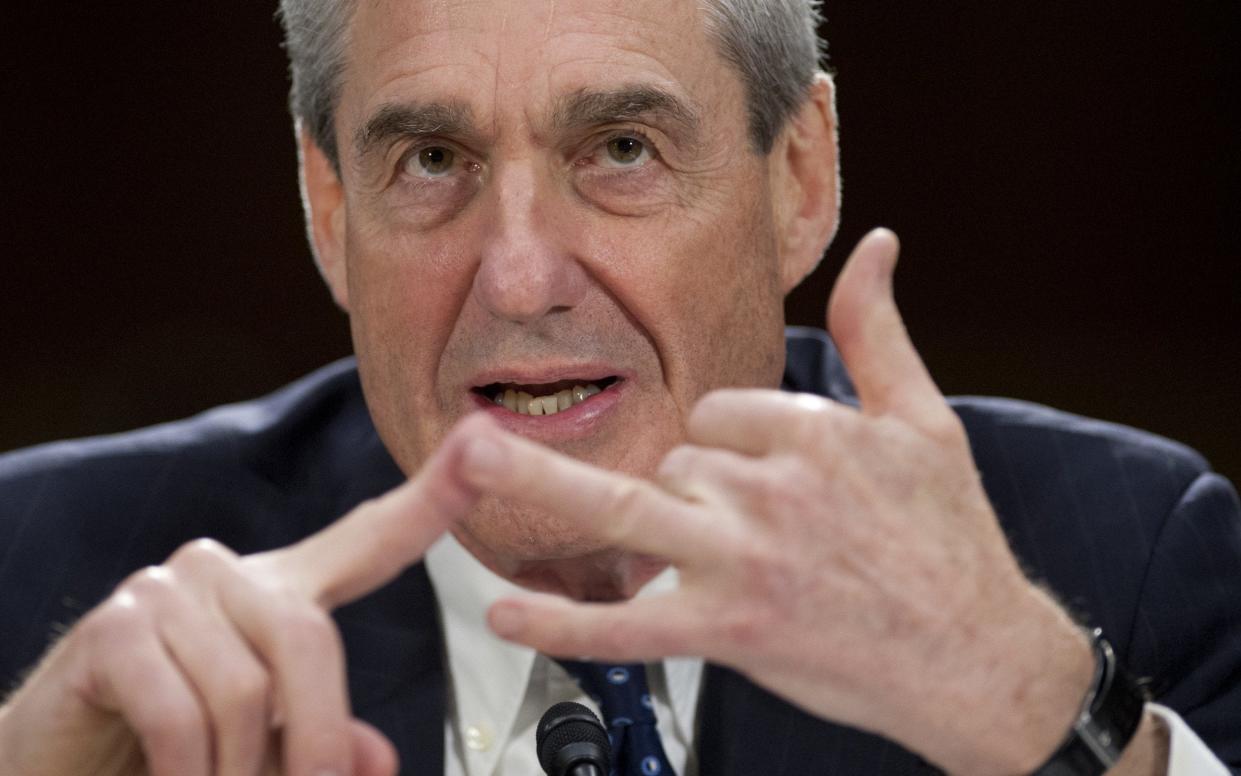
Since Donald Trump's election a shadow has hung over his administration - a federal investigation into possible collusion between the president's campaign and Russian agents.
Robert Mueller, the stern former FBI director now leading the investigation, has charged dozens of individuals with crimes ranging from election interference to fraud along the way.
Mr Trump has denounced the probe as a "witch hunt" - a view held by a number of leading Republicans.
However the alleged crimes detailed by Mr Mueller's team so far indicate the potential extent of the attempt to interfere in the 2016 presidential election.
With the wide-reaching investigation reportedly aiming to reach its conclusion by September 1, here is a timeline of the key events to date.
May 2016

Over drinks in a London wine bar, George Papadopoulos reportedly tells Alexander Downer, Australia’s High Commissioner to the UK, that he is aware that Russia has compromising material on Hillary Clinton. This later becomes the spark for the Russia investigation.
June 9, 2016
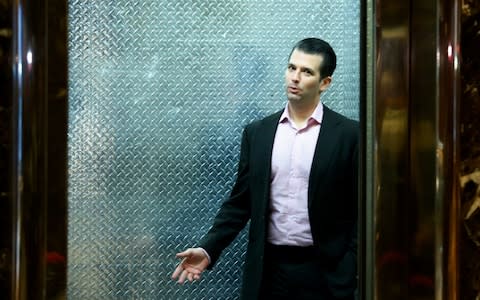
The president's oldest child, Donald Trump Jr, campaign chairman Paul Manafort and Mr Trump's son-in-law, Jared Kushner, meet at Trump Tower with a Kremlin-linked lawyer, Natalia Veselnitskaya, believing they will receive damaging information about Mrs Clinton. Mr Kushner fails to initially report the meeting to the government, as required, when he takes a position in the administration as a senior adviser.
June 15, 2016
A hacker calling himself Guccifer 2.0 leaks the Democratic National Committee’s (DNC) opposition research on Mr Trump. Security experts link the data breach to Russian hackers.
June 20, 2016
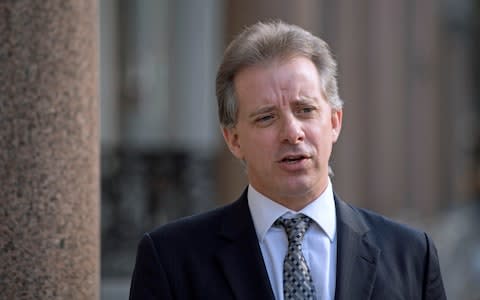
Christopher Steele, a British former spy, produces the first of his private memos into Mr Trump’s alleged ties to Russia, later to be known as the ‘dirty dossier’. They are funded first by a Republican rival, then by the Democratic National Committee. The work is done on behalf of Washington consulting firm Fusion GPS. The compromising information on the Republican candidate includes claims he slept with prostitutes at a Moscow hotel in 2013.
Early July 2016
Mr Steele hands the information he’s gathered on Mr Trump over to the FBI. The former intelligence officer had been a source for the agency in the past.
July 22, 2016
WikiLeaks publishes thousands of emails stolen from the DNC - days before the Democratic convention is due to begin.
July 2016
The FBI begins investigating possible links between the Russian government and the Trump campaign. It comes after Australian authorities alert the agency to Mr Papadopoulos's earlier comments on Russian dirt to their diplomat in London. The Australians' decision to alert the FBI is made after the stolen Democratic emails are released, and Mr Papadopoulos's allusion to Russian information appears to have greater significance.
August 19, 2016

Mr Manafort quits the Trump campaign days after news reports emerge claiming he has received payments from Russian-backed Ukrainian figures. The campaign chief denied receiving secret payments or working for the governments of Ukraine or Russia.
September 2016
Congress members are briefed on the CIA’s belief that Russia is intervening in the election to benefit Mr Trump. Republican senator Jeff Sessions, a Trump campaign foreign policy adviser, meets with Sergey Kislyak, the Russian Ambassador to the US, in his Senate office.
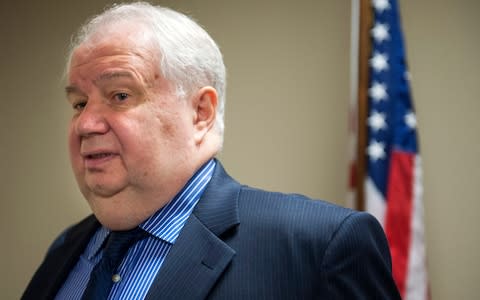
By this point, the Internet Research Agency is spending around $1.25 million a month on interfering with the election according to US prosecutors.
October 7, 2016
Shortly after the publication of a 2005 “Access Hollywood” video in which Mr Trump discusses sexually assaulting women, WikiLeaks releases a batch of emails from Clinton campaign chairman John Podesta’s email account. The leaks continue for weeks.
October 12, 2016
WikiLeaks contacts Trump Jr on Twitter to ask him to share a link to file archives. Shortly afterwards, the candidate tweets about the leaks.
October 21, 2016
The FBI obtains a warrant to wiretap Carter Page, a former foreign policy adviser on the Trump campaign.
October 28, 2016
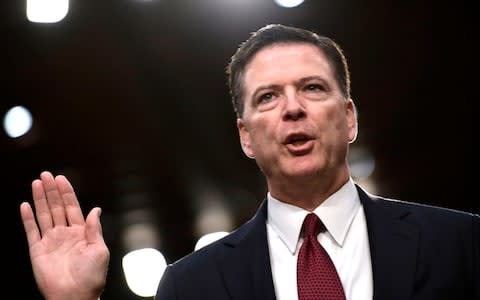
James Comey, the FBI Director, sends a letter to Congress announcing the agency has reopened its investigation into Mrs Clinton’s use of a private email server while she was Secretary of State. He does not publicly reveal the FBI is investigating the Trump campaign.
November 8, 2016
Mr Trump is elected president.
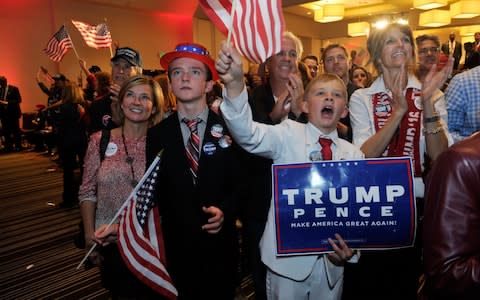
November 10, 2016
In his Oval Office meeting with Mr Trump, Barack Obama reportedly warns the president-elect against putting Michael Flynn in a high level position within his administration.
November 18, 2016
Mr Trump offers Mr Flynn the job of national security adviser and Mr Sessions the job of attorney general - two of the first appointments the president-elect makes.
Late November 2016
Members of the Trump transition team reportedly warn Mr Flynn that his communications with Ambassador Kislyak will be monitored by US intelligence agencies.
November 30, 2016
The Justice Department informs Mr Flynn that he is under investigation for his unreported lobbying on behalf of Turkey.
December 1, 2016

Mr Flynn and Mr Kushner meet with Mr Kislyak, the Russian ambassador, at Trump Tower. Mr Kushner allegedly proposed setting up a back-channel of communication between the administration and Vladimir Putin, the Russian president.
December 22, 2016
Mr Flynn contacts Ambassador Kislyak to urge Russia to oppose a resolution about Israeli settlements. Russia is one of several countries Mr Flynn contacts, allegedly at the behest of Mr Kushner.
December 29, 2016
The Obama administration issues new sanctions against Russia in response to its interference in the US election.
Mr Flynn calls Ambassador Kislyak multiple times about the sanctions and asks Russia not to retaliate. He later tells Mr Flynn that Russia "had chosen to moderate its response to those sanctions as a result of his request", according to investigators.
December 30, 2016
In a tweet, Mr Trump praises Putin’s decision not to respond to the US sanctions.
Great move on delay (by V. Putin) - I always knew he was very smart!
— Donald J. Trump (@realDonaldTrump) December 30, 2016
January 4, 2017
Mr Flynn tells Donald McGahn, the Trump campaign’s top lawyer, that he is being investigated by the FBI.
January 6, 2017
US intelligence agencies release a detailed report on Russian election interference.
Mr Comey briefs Mr Trump at Trump Tower in New York. The FBI director says Mr Trump is not personally under investigation as part of the agency’s counterintelligence case. He also informs Mr Trump of the contents of Mr Steele’s dossier, including the allegation involving prostitutes in a Moscow hotel. Mr Trump denies the allegation.
January 10, 2017
In his Senate confirmation hearing for the attorney general post, Mr Sessions denies under oath contacting Russian officials during the election campaign.
Mr Steele’s ‘dirty dossier’ is leaked by Buzzfeed News, despite containing a series of unverified claims. The explosive 35-page report creates a legal storm.
FAKE NEWS - A TOTAL POLITICAL WITCH HUNT!
— Donald J. Trump (@realDonaldTrump) January 11, 2017
January 11, 2017
The next day Mr Trump holds a press conference in Trump tower decrying the "highly salacious" dossier, saying he has been a victim of "fake news".
"Does anyone really believe that story?", Mr Trump asks the audience.
He adds: "I'm also very much of a germaphobe, by the way, believe me."
.@PeteHegseth on @FoxNews “Source #1 was the (Fake) Dossier. Yes, the Dirty Dossier, paid for by Democrats as a hit piece against Trump, and looking for information that could discredit Candidate #1 Trump. Carter Page was just the foot to surveil the Trump campaign...” ILLEGAL!
— Donald J. Trump (@realDonaldTrump) July 22, 2018
January 18, 2017
Mr Kushner submits his application for top-secret security clearance, excluding a number of meetings with foreign officials, including the December Trump Tower meeting with a Russian lawyer.
January 20, 2017
Mr Trump is inaugurated as president.
January 20th 2017, will be remembered as the day the people became the rulers of this nation again.
— Donald J. Trump (@realDonaldTrump) January 20, 2017
January 22, 2017
Mr Flynn is sworn in as national security adviser.
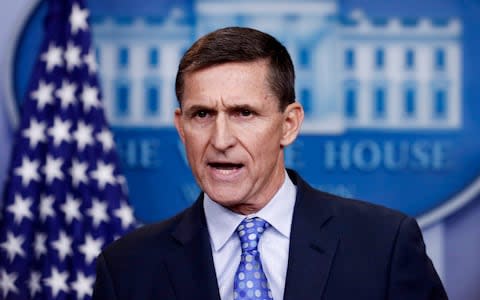
January 24, 2017
During an FBI interview, Mr Flynn lies about his conversations with Ambassador Kislyak.
January 26, 2017
Sally Yates, the acting attorney general, is briefed on the Flynn interview and warns the White House that the national security adviser could be vulnerable to Russian blackmail.
Mr Trump’s lawyer later says the president knew that Mr Flynn lied to the FBI by late January.
January 27, 2017
The FBI director claims Mr Trump told him “I need loyalty, I expect loyalty” over dinner at the White House, a move which could be seen as an attempt to steer the Russia investigation. Mr Trump has vehemently denied the claim. Mr Comey adds that the president tells him that Mr Flynn “has serious judgment issues”. He also again denies the allegations involving prostitutes at a Moscow hotel, denying he even spent the night in Moscow.
February 8, 2017
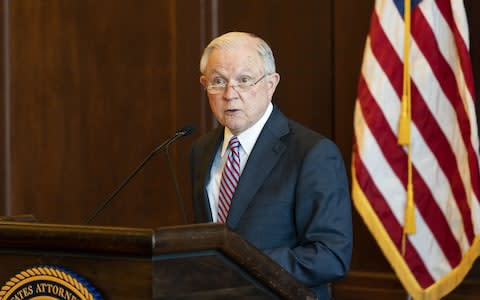
Mr Sessions is confirmed as attorney general.
February 13, 2017
Mr Flynn resigns as national security adviser after just 24 days in the post.
February 14, 2017
During a meeting in the Oval Office, Mr Trump reportedly asks Mr Comey to end the FBI investigation into Mr Flynn, which could amount to obstruction of justice. The FBI director claims the president told him: “He is a good guy, I hope you can let this go.” Mr Trump denies he made the comments.
March 2, 2017
Mr Sessions announces he will recuse himself from any Russia investigation after his meetings with Ambassador Kislyak are revealed. Rod Rosenstein, the Deputy Attorney General, is now responsible for overseeing the probe.
March 20, 2017
Mr Comey publicly confirms the FBI’s investigation into Russian hacking and potential collusion with individuals in the Trump campaign for the first time while testifying before the House Intelligence Committee.
May 9, 2017
Mr Trump fires Mr Comey. The president alludes to the Russia probe in his letter to the FBI director, saying "I greatly appreciate you informing me... I am not under investigation".
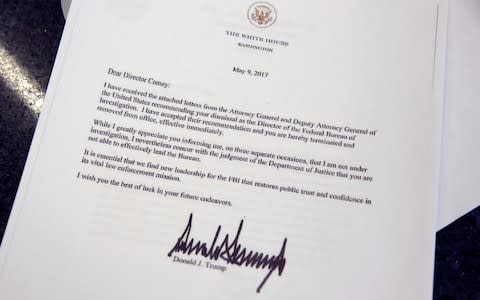
May 17, 2017
Robert Mueller, a former FBI director, is appointed as special counsel to oversee the Russia investigation following Mr Comey’s departure.

June 2017
Mr Trump reportedly asks White House lawyer Donald McGahn to have the special counsel fired, but backs down when Mr McGahn threatens to quit over the request. The report prompts suggestions Mr Trump may have sought to obstruct justice. The president later dismisses the reports as “fake news”.
July 27, 2017
Mr Papadopoulos is arrested at Washington’s Dulles International Airport.
August 1, 2017
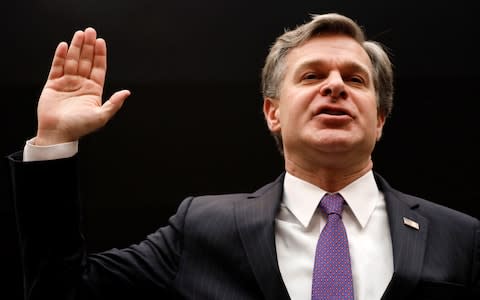
Christopher Wray takes over as FBI director.
October 5, 2017
Mr Papadopoulos pleads guilty to lying to the FBI about his efforts to put the Trump campaign in contact with Kremlin figures. Mr Papadopoulos enters a plea agreement with Mr Mueller, suggesting he has agreed to become an informant for a lesser sentence, but this is not made public until later in the month.
October 2017
Former White House chief of staff Reince Priebus; former press secretary Sean Spicer and Sam Clovis, a Trump campaign foreign-policy adviser, are all interviewed by Mr Mueller’s team.
October 30, 2017
Mr Mueller’s team reveals charges against former Trump campaign staff - Mr Manafort and his associate Rick Gates are charged on 12 counts, including conspiracy to launder money and making false statements. Mr Papadopoulos‘ guilty plea is made public in court filings.
November 2017
The Russia investigation interviews Mr Kushner, White House adviser Stephen Miller and White House counsel Donald McGahn.
November 30, 2017
Mr Flynn pleads guilty to lying to the FBI in his January interview.
December 7, 2017
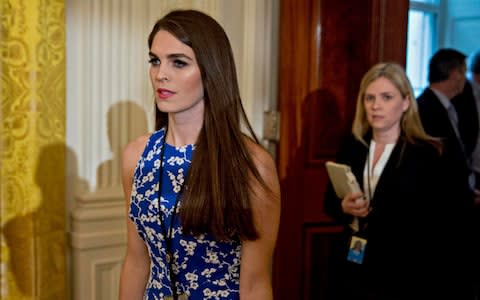
Hope Hicks, the White House communications director, is interviewed by Mr Mueller’s team. The following month Mr Sessions is also interviewed.
February 2, 2018
Republicans on the House Intelligence Committee release a memo accusing the Justice Department and FBI of an abuse of power during the Russia investigation. The memo also accuses Peter Strzok, an FBI agent on the investigation, of anti-Trump bias. The special counsel removed Mr Strzok from the investigation after he learned the agent had exchanged anti-Trump texts.
February 16, 2018
Mr Mueller’s team reveals charges against 13 Russian nationals and three organisations linked to the Internet Research Agency for unlawfully engaging in “operations to interfere with elections and political processes”. The charges reveal the full scale of alleged Russian election meddling and recounts their alleged crimes in remarkable detail, describing how Russian agents created hundreds of social media accounts to influence the election.
February 22, 2018
Mr Mueller files additional charges against Mr Gates and Mr Manafort including bank fraud and failure to declare foreign bank accounts.
February 23, 2018
Mr Gates makes a plea deal with the special counsel.
June 4, 2018
Mr Trump claims he has the “absolute right” to pardon himself and calls the appointment of the special counsel “totally unconstitutional”.
June 8, 2018
Mr Mueller files charges against Konstantin Kilimnik, a political operative with alleged ties to Russian intelligence, bringing his probe a step closer to the Kremlin's door. The indictment includes new charges of witness tampering against Mr Manafort, the third set of charges to be added since he was indicted in October.
June 15, 2018
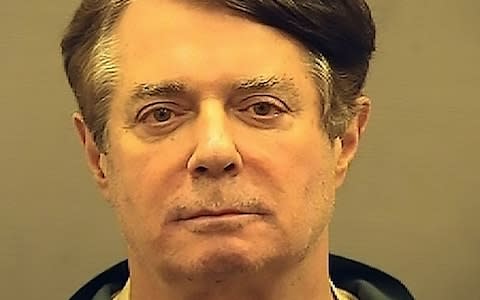
Mr Manafort is sent to jail after a judge revokes his bail. The former Trump campaign manager is accused of contacting witnesses while awaiting trial for fraud charges.
July 13, 2018
The Russia investigation announces criminal charges against 12 officers from Russia’s online troll factory, the GRU. The individuals are accused of hacking the DNC and the Clinton campaign.
July 16, 2018
Donald Trump appears to side with Vladimir Putin over his own intelligence officials during a joint press conference in Helsinki, praising the Russian president’s “extremely strong and powerful” denial over election meddling.
He added: “I don’t see any reason why it would be” Russia who interfered in the 2016 presidential race.
Let's go to the video tape (again). https://t.co/MK9WWY0Ipfpic.twitter.com/qTAdwoyQ3N
— Chuck Schumer (@SenSchumer) July 24, 2018
The next day, after a fierce backlash from Democrats and Republicans, Mr Trump made a statement in the White House saying he misspoke and meant the opposite. He clarified that he should have said "I don't see any reason it wouldn't be" Russia. He called the sentence he meant to say a "bit of a double negative".
August 18, 2018
Mr McGahn, the White House counsel, has co-operated extensively with the Russia investigation and spent more than 30 hours with Mr Mueller's team, the New York Times reports.
Following the report, Mr Trump said he allowed Mr McGahn to fully co-operate with investigators. The revelation is significant because Mr McGahn will be a key witness to Mr Trump's thinking at significant points - for instance in the days leading up to his firing of James Comey, the former FBI director.
Historians have drawn comparisons with John Dean, the White House counsel during Richard Nixon's presidency, who handed prosecutors key information about his attempts to obstruct justice.
Hours later, Mr Trump appears to be rattled by the news reports, sending out a string of tweets in which he compares the Russia investigation with the 1950s hunt for communists led by Senator Joseph McCarthy.
Study the late Joseph McCarthy, because we are now in period with Mueller and his gang that make Joseph McCarthy look like a baby! Rigged Witch Hunt!
— Donald J. Trump (@realDonaldTrump) August 19, 2018
August 20, 2018
Mr Trump sends out a series of attacks aimed at Mr Mueller and his team calling the special counsel "disgraced and discredited".
He goes on: "Where’s the Collusion? They made up a phony crime called Collusion, and when there was no Collusion they say there was Obstruction (of a phony crime that never existed). If you FIGHT BACK or say anything bad about the Rigged Witch Hunt, they scream Obstruction!"
The comments come as the jury in the trial of Mr Manafort, the president's former campaign chairman, continue to deliberate a verdict.
August 21, 2018
Mr Manafort is found guilty of eight financial crimes in the first trial of the Russia investigation - a major victory for the special counsel.
A judge declared a mistrial on 10 other counts the jury could not agree on, however Manafortt, who led Mr Trump's election effort during a crucial stretch of 2016, is still facing a lengthy prison stretch.
The verdict was part of a stunning one-two punch of bad news for the White House, coming as the president's former lawyer, Michael Cohen, was pleading guilty in New York to campaign finance violations arising from hush money payments made to two women who say they had sexual relationships with Mr Trump.
November 7, 2018
Mr Trump forces Jeff Sessions, the US attorney general, to quit, plunging the Russia investigation into deep uncertainty. Matthew Whitaker, Mr Sessions’s chief of staff, will fill the role of acting attorney general. Mr Whitaker has previously suggested that a replacement to Mr Sessions could slash Mr Mueller’s budget so the investigation "grinds to almost a halt".
It raises questions about whether Robert Mueller, the special counsel leading that investigation who reports to the Justice Department, will face more restrictions in the coming months. The person Mr Trump selects as attorney general is likely to oversee the Russia investigation personally, raising fears the president could pick an ardent supporter who could protect him.
November 21, 2018
Mr Trump submitted written responses to questions from Mr Mueller's team. Earlier in the month, news outlets reported that Mr Trump had spent several days with his lawyers drafting his answers. "I write the answers. My lawyers don't write answers," Mr Trump said in response.
November 26, 2018
Mr Mueller's team accuses Manafort of lying to them, breaking his plea deal. They urge a judge to press ahead with sentencing the former Trump campaign chairman, arguing he no longer deserves the leniency their agreement gave him.
November 29, 2018
In a surprise announcement, Cohen pleads guilty to lying to Congress about the Russia investigation, including misleading the chamber about the fact he was pursuing a project to build a Trump tower in Moscow deep into the 2016 presidential campaign.

Cohen said he lied two congressional committees in 2017 in order to minimise the links between the Moscow project and Mr Trump. Court documents said he gave the “false impression” that the project had ended in January 2016 - before the first Republican primary vote - when in fact he pursued it until June 2016.
December 12, 2018
Cohen is sentenced to three years in prison. During the sentencing hearing it emerges that Cohen has given Mr Mueller's team “wide-ranging and helpful” information. However, prosecutors in the southern district of New York recommend a “substantial term of imprisonment” for Cohen for the egregious nature of his crimes and his lack of assistance. On the same day, the New York prosecutors also reveal they have come to an agreement with American Media Company, Inc. the National Enquirer's publisher over a payment made during the election campaign to a woman alleging an affair with Mr Trump.
December 20, 2018
Matt Whitaker, the acting attorney general, says he will not recuse himself from overseeing the Russia investigation. Mr Whitaker had previously criticised the probe and suggested it could be curtailed but slashing the special counsel's budget.
January 25, 2019

Roger Stone, a longtime friend and adviser to Mr Trump, is arrested during an early morning FBI raid of his home in Fort Lauderdale, Florida. Mr Stone indicted on seven counts, including one count of obstruction of an official proceeding, five counts of false statements and one count of witness tampering in Mr Mueller’s investigation.
February 14, 2019

Bill Barr is sworn in as attorney general. Mr Barr now oversees the Russia investigation and has ultimate say over how much of Mr Muller's final report is made public.
February 27, 2019
Cohen testifies publicly for the first time, telling Congress his former boss was a "liar", a "cheat" and a "racist". Cohen claims Mr Trump participated in insurance fraud and directed him to make hush-money payments to women alleging affairs even though he knew it was wrong. Mr Trump has denied those claims, saying Cohen is attempting to get a more lenient prison sentence.
March 22, 2019
Mr Mueller submits his report, as is required, to the US department of justice following an investigation that lasted 674 days.
It will now be up to Mr Barr, the US attorney general, to decide how much of the report to release to Congress and the public.
March 24, 2019
Mr Barr releases a four-page summary of the Mueller report which states that Mr Trump and his aides did not collude with Russia in the 2016 election campaign. Mr Mueller did not reach a decision on whether Mr Trump obstructed justice in his alleged attempts to thwart the investigation - meaning it was not a total victory for the president - instead deciding not to come to a conclusion.
The summary of the report quotes Mr Mueller saying of obstruction of justice: “While this report does not conclude that the President committed a crime, it also does not exonerate him".
Mr Barr and Rod Rosenstein, the deputy attorney general, decided there was not enough evidence to conclude that Mr Trump had acted with “corrupt intent”, and therefore decided he had not obstructed justice.
Mr Mueller also decided to recommend no further indictments and has no sealed indictments waiting to be made public, meaning he will not bring any more charges now his probe is complete.

